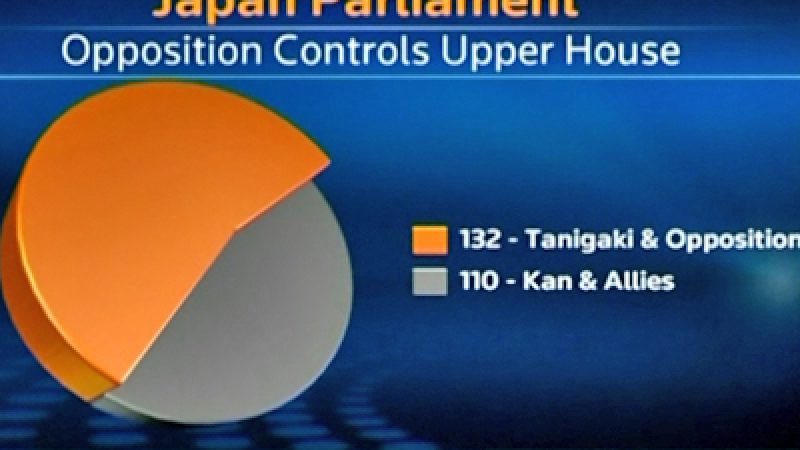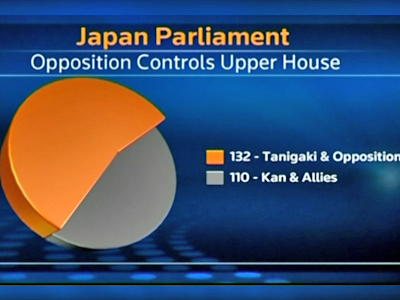
Japan’s Politics Worries Investors

Japan faces its toughest challenge since World War II.
How it emerges from the crisis will depend on two leaders: Japan’s prime minister, Naoto Kan, and his opposition rival, Sadakazu Tanigaki.
They face an opportunity to stand united… or fall divided.
Their relationship will be key in the wake of Japan’s biggest natural disaster – one that has left more than 20,000 dead or missing, and countless more without homes.
However, the Japanese leaders are far from united and that worries investors.
Last week Tanigaki rejected Kan’s proposal to join an expanded cabinet.
Some say years of mistrust between their parties will be hard to overcome.
[Toshiro Muto, Former Deputy Governor, Bank of Japan]:
It’s hard to imagine that Japan’s political chaos could develop a mutual trust as a result of these disasters. The opposition’s mistrust has unfortunately brewed to this extent.”
Japan’s prime minister is the country’s sixth in five years.
Unlike previous prime ministers from political blue blood, he’s the son of a businessman, having previously been a lawyer and civic activist.
By contrast, the man hoping to replace him is a veteran of the LDP and a former finance minister.
He has a more traditional background, coming from a family of politicians. His father was once the education minister.
The ruling party controls the powerful lower house of parliament.
But the Tanigaki-led opposition controls the upper house. That often prevents bold policy, but bridging that divide may make or break the country.
[Makoto Utsumi, Former Japan Vice Finance Minister]:
“A bold policy and recovery plan is needed. And if the government can put together a regional policy, focusing on the Tohoku region with significant public work projects, then that could be positive for the economy.”
Most pressingly, the next fiscal year’s budget will have to take into considerations the costs to cleanup and rebuild these quake affected areas that could cost almost $200 billion – a tricky task for a country with such heavy debt.
Compromise will be key. Kan may need to give up on popular campaign pledges like child allowances and free highways, and find common ground in raising money.
[Tsuneo Watanabe, Tokyo Foundation]:
“Japan will be weighed down by another significant public finance project. Resolving this in the long-term will mean thinking about taxes and social welfare but particularly raising taxes.”
Political division and timid policies contributed to Japan’s so-called “lost decades” before this earthquake.
And mistrust runs deep in this parliament. Whatever their differences though, opposing parties will have to come together as one just like they did after World War II. Or risk hurling Japan into a fiscal nightmare.
 Foto: NTD
Foto: NTD



![[Live] Magdeburg: Pressekonferenz mit Polizei und Staatsanwaltschaft](https://images-de.epochtimes.de/uploads/2024/12/THUMB-PK-Magdeburg-400x225.jpg)























vielen Dank, dass Sie unseren Kommentar-Bereich nutzen.
Bitte verzichten Sie auf Unterstellungen, Schimpfworte, aggressive Formulierungen und Werbe-Links. Solche Kommentare werden wir nicht veröffentlichen. Dies umfasst ebenso abschweifende Kommentare, die keinen konkreten Bezug zum jeweiligen Artikel haben. Viele Kommentare waren bisher schon anregend und auf die Themen bezogen. Wir bitten Sie um eine Qualität, die den Artikeln entspricht, so haben wir alle etwas davon.
Da wir die Verantwortung für jeden veröffentlichten Kommentar tragen, geben wir Kommentare erst nach einer Prüfung frei. Je nach Aufkommen kann es deswegen zu zeitlichen Verzögerungen kommen.
Ihre Epoch Times - Redaktion